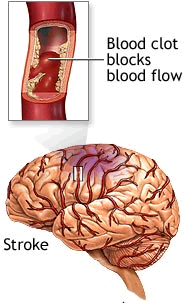HIV
Infection and HIV/HCV Coinfection Increased Risk of Strokes in Veterans
Study
 |
 |
 |
 |
 |
 |
 |
| SUMMARY:
HIV positive veterans had about twice the risk of having a
stroke as their HIV negative counterparts, and being coinfected
with hepatitis C virus (HCV) further elevated the risk, but
hepatitis C alone conferred an insignificant increase, according
to a poster presented at the 17th Conference on Retroviruses
& Opportunistic Infections (CROI
2010) last month in San Francisco. The researchers suggested
stroke death may have been underestimated in the past. |
|
 |
 |
 |
 |
 |
 |
 |
By
Liz Highleyman
 Numerous
prior studies have found associations between cardiovascular disease
in both people with HIV and those
with chronic hepatitis C, but most
of this research has focused on heart outcomes such as myocardial infarction
rather than strokes. Less research has looked at cardiovascular outcomes
in HIV/HCV coinfected
people.
Numerous
prior studies have found associations between cardiovascular disease
in both people with HIV and those
with chronic hepatitis C, but most
of this research has focused on heart outcomes such as myocardial infarction
rather than strokes. Less research has looked at cardiovascular outcomes
in HIV/HCV coinfected
people.
Jason Sico and fellow investigators with the Veterans Aging Cohort Study
(VACS) analyzed data from 8579 participants (all men) in the VACS Virtual
Cohort who took part in the 1999 Large Health Study of Veteran Enrollees.
Within this group, 1687 (20%) had HIV alone, 701 (8%) had HCV alone,
738 (9%) were HIV/HCV coinfected, and 5453 (64%) had neither virus.
None of the participants had cardiovascular diseases or cancer at baseline.
The researchers analyzed data on HIV and HCV status, stroke risk factors,
incidence of stroke, and mortality collected from January 2000 to July
2007. The median follow-up period was 7.3 years. Diagnosis of stroke
was based on inpatient and outpatient ICD-9 codes.
Results
 |
A
total of 160 strokes were reported during the follow-up period: |
| |
 |
HIV+/HCV+:
29 (18.1% of all strokes); adjusted incidence rate 6.99 per
1000 person-years; |
 |
HIV+/HCV-:
28 (17.5%); 2.93 per 1000 person-years; |
 |
HCV+/HIV-:
19 (11.9%), 4.13 per 1000 person-years; |
 |
HIV-/HCV-:
84 (52.5%), 2.38 per 1000 person-years. |
|
 |
A
total of 1181 deaths were reported: |
| |
 |
HIV+/HCV+:
252 (21.3% of all deaths); adjusted mortality rate 60.6 per
1000 person-years; |
 |
HIV+/HCV-:
380 (32.2%); 39.0 per 1000 person-years; |
 |
HCV+/HIV-:
94 (8.0%); 20.5 per 1000 person-years; |
 |
HIV-/HCV-:
455 (38.5%); 12.9 per 1000 person-years. |
|
 |
In
a model adjusting for potential confounding factors including demographics,
cardiovascular risk factors, and substance use, the hazard ratios
(HR) for strokes were: |
| |
 |
HIV+/HCV+:
HR 2.08; |
 |
HIV+/HCV-:
HR 1.34; |
 |
HCV+/HIV-:
HR 1.36; |
 |
HIV-/HCV-:
HR 1.0 (comparison group). |
|
 |
In
a second model adjusting for the same factors but treating death
as a competing risk, the hazard ratios were: |
| |
 |
HIV+/HCV+:
HR 2.21; |
 |
HIV+/HCV-:
HR 2.13; |
 |
HCV+/HIV-:
HR 1.44; |
 |
HIV-/HCV-:
HR 1.0 (comparison group). |
|
 |
HIV
infection alone was associated with a 2-fold risk of stroke in the
second model, though it did not reach statistical significance in
the first. |
 |
HCV
alone increased the stroke risk more in the second model than the
first, but neither reached significance. |
 |
HIV/HCV coinfection more than doubled the stroke risk in both models. |
These
findings led the investigators to conclude, "Chronic HIV infection
with and without hepatitis C coinfection is associated with an increased
risk of stroke."
"The
risk of stroke in HIV and HIV/HCV infected people may be under-appreciated
due to the excess competing risk of death," they continued. "If
confirmed in other studies, these findings have important implications
for clinical management of those aging with HIV infection.
Yale
Sch of Med, New Haven, CT; VA Connecticut Healthcare System, West Haven
VAMC, CT; Univ of Pittsburgh Sch of Med, Pittsburgh, PA; Boston Med
Ctr, Boston, MA; George Washington Univ Sch of Med and Washington DC
VAMC, Washington, DC; David Geffen Sch of Med, Univ of California, Los
Angeles and the VA Greater Los Angeles Health Care System, Los Angeles,
CA; Emory Univ Sch of Med and Atlanta VAMC, Atlanta, GA; Univ of Pittsburgh,
Grad Sch of Public Health, Pittsburgh, PA.
3/5/10
Reference
J
Sico, J Chang, M Freiberg, and others. HIV Infection, Hepatitis C Infection,
and the Risk of Stroke in the Veterans Aging Cohort Study Virtual Cohort
(VACS-VC). 17th Conference on Retroviruses & Opportunistic Infections
(CROI 2010). San Francisco. February 16-19, 2010. (Abstract
668).